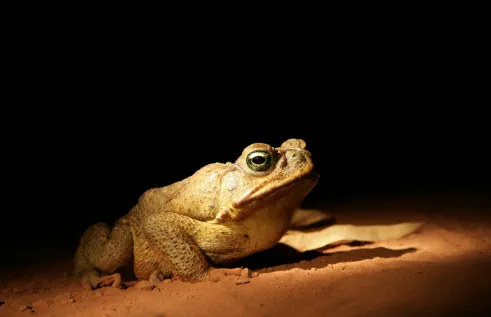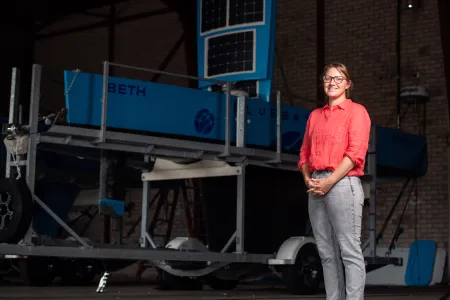News
A CDU researcher wants a fleet of uncrewed vessels scouring the oceans to help us better understand and protect them
In the future uncrewed vessels (USVs) will roam the world’s oceans providing valuable data to oceanographers and meteorologists, while also protecting it against illegal fishing and smuggling, that’s the vision of one Charles Darwin University (CDU) researcher.
CDU PhD candidate Ruth Patterson is studying the potential of using USVs for continuous data collection and surveillance in every corner of our oceans.
“Northern Australia is the perfect environment to test USV technology. Northern Australia is remote so using crewed ships is expensive, time consuming and dangerous during wild weather,” Ms Patterson said.
Ms Patterson published a study in Frontiers in Marine Science last month evaluating why USV technology was not being adopted more widely for surveillance and data gathering, despite its advantages.
“Right now, most USVs need to be remote controlled in sight of the operator, or launched from a mothership, which really defeats the potential of them being autonomous,” she said.
“USVs will be valued most in very remote locations where they can be controlled using internet and launched from dirt boat ramps or the beach.”
“There are few USVs on the market that are suitable for continuous voyage and capable of surviving rugged ocean conditions.”
Ms Patterson said because of the limitations of USVs on the market, research was still piggybacking off commercial ships to collect data, which was flawed.
“Most researchers use these ships of opportunity to collect valuable data, but the ships mostly travelled in certain commercial sea corridors, leaving vast ocean areas unstudied,” she said.
“People think that satellites can provide the solutions for data gathering, but during times of heavy cloud that technology is unreliable.”
She said USVs can not only travel in remote regions that are not often explored for data but can also be used by multiple agencies for a variety of tasks from weather data collection to maritime border protection.
Last year a team from the US designed an USV to sail through the eye of a hurricane, and successfully completed a voyage through Hurricane Sam in September collecting data that the world hasn’t seen before.
“That’s a game changer… that’s exciting. Piloting an USV through a hurricane shows the potential of the vessels to go where no one else can,” she said.
While USVs are getting tested in extremes, such as hurricanes, Ms Patterson is testing the durability of USVs to remain on the water permanently collecting data and protecting marine environments.
“These are wind and solar powered, the only reason they would stop would be because of fouling on the hull, but that takes many months,” she said.
Fouling of the hull is the accumulation of organic materials, such as shellfish and seaweeds, that ultimately sink the boats.
Ms Patterson said that what’s being learn about USVs from research in the Northern Territory is relevant for similar projects around the world.
Related Articles

Nanoplastics hindering cognitive abilities of fish, international research shows
Nanoplastic exposure can impair the cognitive abilities of fish and could lead to significant impacts on marine species’ ability to survive, according to a new international study.
Read more about Nanoplastics hindering cognitive abilities of fish, international research shows
Eradication would cost billions: NT’s lessons for Pilbara’s cane toad management
Cane toads are predicted to invade Western Australia’s Pilbara region by 2041 if left unchecked, but the Northern Territory’s population of the pests hold key lessons that could save billions in eradication costs.
Read more about Eradication would cost billions: NT’s lessons for Pilbara’s cane toad management
New project to grow Indigenous aquaculture on one of Australia’s largest islands
An Australian island’s efforts to improve food security and transition into a blue economy will be bolstered by a new project to propagate a nutritious and increasingly popular fish.
Read more about New project to grow Indigenous aquaculture on one of Australia’s largest islands
